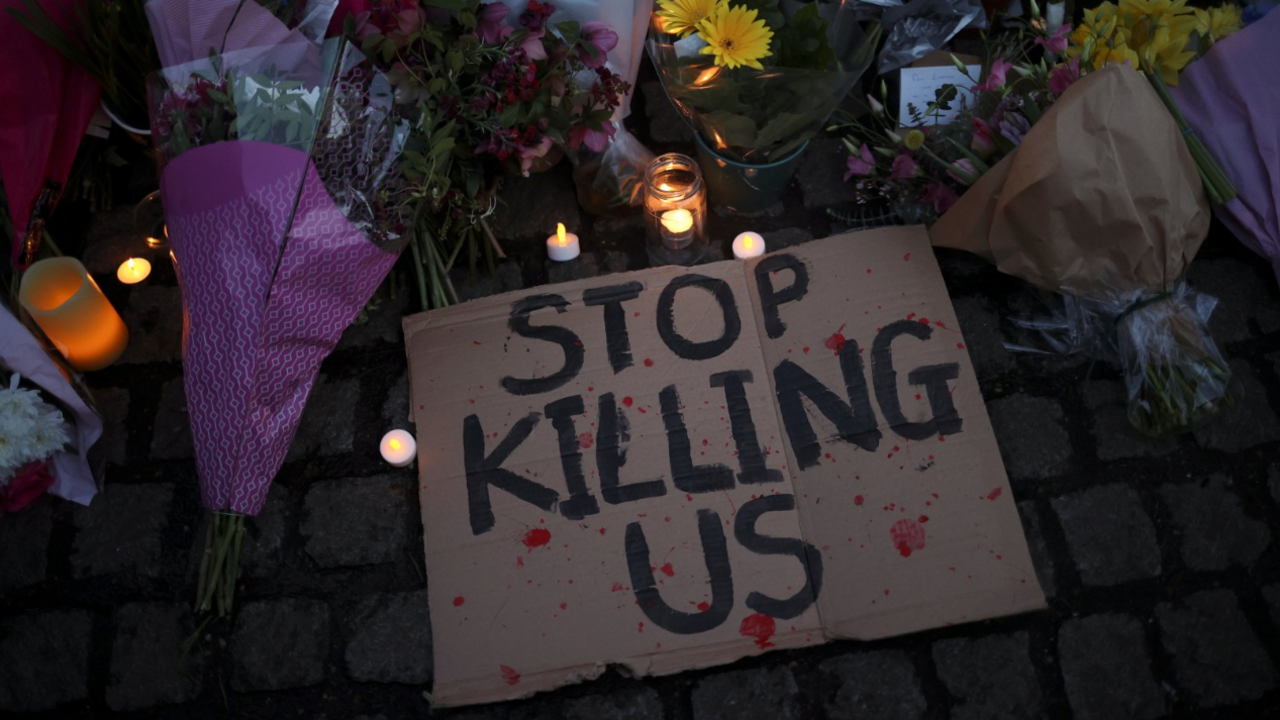Support for plan to make misogyny a hate crime

A sign saying "STOP KILLING US" is seen at a memorial site in Clapham Common Bandstand, following the kidnap and murder of Sarah Everard in 2021
- Published
Labour, the Lib Dems, the Greens and the SNP have all said they would make misogyny a hate crime during an election debate on women's safety.
Lib Dem deputy leader Daisy Cooper said her party would make misogyny a hate crime - not as a new offence but an aggravating factor impacting sentencing.
She was backed by spokespeople from Labour, Greens and the SNP during the discussion on women's safety, as part of BBC Radio 4's Woman's Hour.
The murder of Sarah Everard by a serving police officer in 2021 led to renewed efforts to tackle violence against women and girls, with campaigners arguing misogyny is one of the "root causes".
However, MPs rejected a Lords amendment, external to public order legislation that would have made misogyny a hate crime in February 2022.
The Law Commission has previously recommended, external that adding “sex or gender” to the protected characteristics for aggravated offences could create "unhelpful hierarchies of victims" and, in some cases, be counterproductive.
Why is misogyny not a hate crime?
- Published5 October 2021
Misogyny shouldn't become a hate crime - Patel
- Published21 February 2022
MPs reject proposal to make misogyny a hate crime
- Published28 February 2022
Ms Cooper said Lib Dems had supported legislation on tackling sexual harassment at work, criminalising up-skirting and banning revenge porn.
She said: "There is broad support for making misogyny a hate crime and Liberal Democrats are committed to doing that."
Asked whether she supported the move, Labour's Sarah Jones supported the plans, adding: "Our country, on the broader issue, faces a tidal wave of violence against women and girls and there is total impunity for the vast majority of those responsible.
"So we will set a target to halve violence against women and girls, which is incredibly ambitious, and will take a raft of measures to do."
Labour deputy leader Angela Rayner had already pledged to make misogyny a hate crime at the party's annual women's conference last year.
Ms Jones said a Labour government would also bring abuse experts into court, introduce minimum sentencing for rape, and create a register "to give domestic abusers no place to hide".
Another supporter was Ellie Chowns for the Green Party, who said violence against women and girls was "absolutely a priority" for her party.
"We would make misogyny a hate crime across the UK," she said, adding there would also be a UK-wide strategy to tackle gender-based violence, more training for police, and funding for councils to support charities supporting victims.
The SNP's Hannah Bardell also backed the idea, highlighting how her party had commissioned the Labour peer and human rights lawyer Helena Kennedy to carry out a review of the law in Scotland.
Stalking was the focus for Plaid Cymru's Liz Saville Roberts comments, who said probation services in particular "has to be changed for women to feel safe". She also wanted a separate Victim's Commissioner for Wales.
Reform UK's Maria Bowtell said the issue came back to policing and her party pledged 40,000 more police officers in England and Wales, funded by stopping paying interest to the banks.
Asked if that was the main issue, she added: "Well, for me no, I would say grooming gangs as well, so if they have dual citizenship and they commit a crime such as rape or they're part of a grooming gang they are deported, because that's not spoken about enough."
For the Conservatives, Mim Davies, defended the government's record and said it had changed the law on stalking and domestic violence.
She said the Conservative manifesto had made it very clear that protecting women and girls was "at the heart of what we do".
